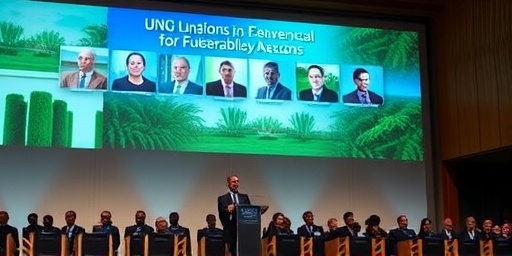In a bittersweet outcome from the latest UN climate talks in Baku, Azerbaijan, world leaders have secured a landmark pledge for climate finance to aid nations battered by global warming, yet the conference ended without any binding commitment to phase out fossil fuels. This mixed result highlights deepening divides between wealthy polluters and developing countries, as delegates from over 190 nations grappled with the urgent need to limit warming to 1.5 degrees Celsius.
- Climate Finance Breakthrough: $100 Billion Annual Pledge Takes Shape
- Fossil Fuel Phaseout Deadlock: Oil Producers Block Ambitious Reforms
- Energy Markets Brace for Volatility as Fossil Fuel Uncertainty Lingers
- Developing Countries’ Pleas Echo Through Baku: Stories of Resilience and Despair
- Charting the Path Forward: From Baku to COP30 and Global Ambitions
The agreement, reached after two weeks of intense negotiations, commits developed nations to mobilizing at least $100 billion annually in climate finance—a figure long demanded by vulnerable states but only now formalized with clearer timelines and accountability measures. However, the absence of explicit language on transitioning away from fossil fuels has drawn sharp criticism from environmental advocates and small island nations, who warn that it leaves the door open for continued emissions from oil, gas, and coal.
This development comes at a pivotal moment, as extreme weather events—from devastating floods in Pakistan to droughts in East Africa—underscore the human cost of inaction. With energy markets already volatile due to geopolitical tensions and the green energy transition, the talks’ failure to address fossil fuels could prolong uncertainty for investors and consumers alike.
Climate Finance Breakthrough: $100 Billion Annual Pledge Takes Shape
The cornerstone of the UN climate talks was the breakthrough on climate finance, a contentious issue that has plagued negotiations since the 2009 Copenhagen summit. Developing countries, which contribute the least to global emissions but suffer disproportionately from climate impacts, have long argued for financial support to build resilience and adapt to rising seas, intensifying storms, and shifting agricultural patterns.
Under the new agreement, high-income nations like the United States, European Union members, and Japan have recommitted to the $100 billion per year target, originally set for 2020 but repeatedly missed. This time, the pledge includes innovative mechanisms such as green bonds, public-private partnerships, and penalties for non-compliance. “This is a game-changer for the Global South,” said UN Climate Chief Simon Stiell in his closing remarks. “For the first time, we’re not just talking numbers; we’re talking delivery.”
Statistics from the UN Environment Programme (UNEP) paint a grim picture of the need: developing countries require up to $400 billion annually by 2030 to cover adaptation costs alone. The pledged funds will prioritize projects like mangrove restoration in Bangladesh, drought-resistant crops in sub-Saharan Africa, and coastal defenses in the Pacific Islands. One notable initiative highlighted during the talks is a $50 billion adaptation fund for least developed countries, co-led by the UK and India.
Yet, skeptics point out that much of the finance will come from loans rather than grants, potentially burdening already indebted nations. “Climate finance should be reparations, not debt traps,” argued Aminath Shauna, the Maldivian climate envoy, echoing sentiments from the G77 bloc of developing countries.
Fossil Fuel Phaseout Deadlock: Oil Producers Block Ambitious Reforms
While climate finance offered a ray of hope, the UN climate talks faltered spectacularly on the issue of fossil fuels, the primary drivers of the climate crisis. Delegates from fossil fuel-dependent economies, including Saudi Arabia, Russia, and Australia, resisted calls for a structured phaseout, arguing that such measures would cripple their economies without viable alternatives.
The draft text initially proposed by small island states and the EU called for “accelerating the phaseout of unabated fossil fuels in energy systems,” but this was watered down to vague references about “transitioning away” from coal and other high-emission sources. Environmental groups like Greenpeace labeled the outcome a “fossil fuel firewall,” with executive director Jennifer Morgan stating, “We’ve seen history repeat itself—promises without the punch to end the addiction to dirty energy.”
Behind the scenes, lobbying by oil majors played a significant role. Reports from the International Energy Agency (IEA) indicate that fossil fuels still account for 80% of global energy supply, and projections show demand peaking only in the mid-2030s without policy shifts. The talks’ host, Azerbaijan—an oil-rich nation—faced accusations of bias, with critics noting that its state oil company sponsored side events promoting “low-carbon” fossil fuels like natural gas.
Developing countries, many of which rely on fossil fuels for energy security, expressed mixed views. India’s environment minister, Bhupender Yadav, emphasized the need for technology transfers to leapfrog to renewables, saying, “We can’t phase out what we haven’t fully phased in—our priority is affordable energy for 1.4 billion people.” This divide underscores the tension between immediate economic needs and long-term planetary survival.
Energy Markets Brace for Volatility as Fossil Fuel Uncertainty Lingers
The UN climate talks’ inconclusive stance on fossil fuels has rippled into global energy markets, injecting fresh uncertainty into an already turbulent sector. Oil prices, which hovered around $80 per barrel during the conference, dipped slightly post-announcement but analysts predict wider swings as investors reassess the pace of the energy transition.
Energy markets are particularly sensitive to signals from UN climate talks, where policy announcements can influence everything from carbon pricing to renewable subsidies. With no phaseout timeline, major oil exporters may ramp up production, potentially flooding markets and depressing prices in the short term. Conversely, the climate finance pledge could accelerate investments in clean tech, boosting sectors like solar and wind.
According to a BloombergNEF report released amid the talks, fossil fuel investments must decline by 50% by 2030 to meet Paris Agreement goals, yet current trends show only a 10% drop. “The lack of a fossil fuel phaseout leaves energy markets in limbo,” said Fatih Birol, IEA executive director. “We’re seeing greenwashing from producers who tout carbon capture as a silver bullet, but it’s not scaling fast enough.”
In the U.S., the Inflation Reduction Act’s incentives for clean energy have already spurred $100 billion in private investments, but global coordination remains elusive. European markets, hit by the Ukraine crisis, are pushing for diversified supplies, yet LNG imports from fossil-heavy nations complicate the picture. For consumers, this means potential spikes in heating and electricity costs as the world navigates this hybrid energy future.
- Key Market Impacts: Short-term oil price stability but long-term downside risks from renewables.
- Renewable Surge: Climate finance could add 500 GW of solar capacity in developing countries by 2030.
- Investor Caution: ESG funds may shift away from fossil assets, pressuring valuations.
Developing Countries’ Pleas Echo Through Baku: Stories of Resilience and Despair
At the heart of the UN climate talks were the voices of developing countries, whose delegations arrived with tales of loss and demands for justice. Nations like Pakistan, which endured floods in 2022 that displaced 33 million people and caused $30 billion in damages, pleaded for more than money—they sought systemic change.
Sherry Rehman, Pakistan’s climate minister, delivered a poignant address: “Our people are dying from climate change they didn’t cause. The $100 billion is welcome, but without curbing fossil fuels at the source, it’s like mopping the floor during a hurricane.” Similarly, representatives from Vanuatu, facing existential threats from rising seas, invoked the Loss and Damage Fund, now operational with initial contributions totaling $700 million.
These countries, home to over 3.5 billion people, emit less than 20% of global greenhouse gases but bear 75% of adaptation costs, per World Bank data. The talks spotlighted success stories too, such as Kenya’s geothermal projects funded by prior climate finance, which now power 50% of the nation’s electricity. Yet, barriers like high upfront costs and technology gaps persist, with calls for intellectual property waivers on green tech intensifying.
Civil society amplified these narratives, with youth activists staging protests outside the venue. “Developing countries aren’t pawns in this game,” tweeted Fridays for Future co-founder Greta Thunberg. “Fossil fuel phaseout isn’t optional—it’s survival.”
Charting the Path Forward: From Baku to COP30 and Global Ambitions
As the dust settles on the UN climate talks, attention turns to the road ahead, with Brazil hosting COP30 in 2025 poised to revisit fossil fuel commitments. The finance pledge provides a foundation, but experts warn that without bolder action, the world risks overshooting the 1.5-degree threshold by 2030.
Upcoming milestones include national climate plans due in 2025, where countries must outline deeper emissions cuts. The IEA forecasts that tripling renewable capacity globally could create 14 million jobs by 2030, offering economic upside for developing countries if finance flows equitably. International bodies like the IMF are exploring debt relief tied to green transitions, potentially unlocking billions more.
However, geopolitical headwinds loom: U.S. elections could alter commitments, while China’s role as the top emitter and renewable producer remains pivotal. “Baku wasn’t the end; it was a checkpoint,” noted Alok Sharma, COP26 president. “Nations must now translate words into watts—scaling clean energy while honoring the vulnerable.”
For energy markets, the implications are profound: a slower fossil fuel decline might sustain jobs in extraction but accelerate climate risks, from supply chain disruptions to insurance crises. Investors are eyeing opportunities in adaptation tech, with venture capital in climate resilience doubling to $20 billion last year.
Ultimately, the talks reinforce that climate action is a marathon, not a sprint. Developing countries, armed with new funds, are better positioned to build back greener, but the fossil fuel impasse demands renewed urgency. As sea levels rise and temperatures climb, the global community must bridge divides to secure a livable planet for all.








